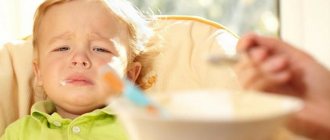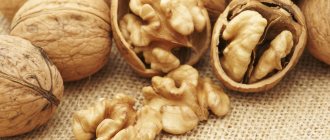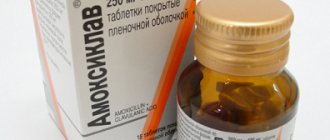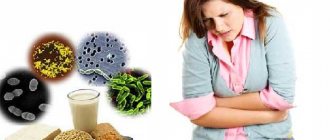The appearance of teeth in children can occur with diarrhea and a number of other symptoms. It is necessary to distinguish this cause of diarrhea from other possible factors. Diarrhea in this case continues for a certain time, exceeding which is considered a deviation from the norm. During this period, it is possible to take certain medications; a certain drinking regimen and nutrition are required.
How can you tell if diarrhea is caused by teething?
In the case of diarrhea in a child, it is important to determine that it relates specifically to teething. This relationship can be identified by accompanying symptoms:
- swollen and swollen gums;
- restless state;
- drooling;
- increase in temperature;
- the need for hard objects to chew on;
- vomiting.
A bottle-fed baby may have constipation instead of diarrhea. During the appearance of baby teeth, the stool is usually watery and the stool is yellow-brown in color. A distinctive feature is the absence of impurities and excessively unpleasant odor. If there is bloating in the abdomen, peristalsis changes, and pain occurs on palpation, then the matter is not only in the appearance of the first teeth. An alarming factor is also the admixture of blood or mucus, the acquisition of a greenish tint in the stool.
Excessive drooling
Increased salivation provokes diarrhea, because only a small part of saliva flows out of the mouth. The main part of the secreted saliva is swallowed by the baby and causes intestinal peristalsis due to the dilution of feces. A supporter of this version is the best pediatrician of all times, the well-known Doctor Komarovsky. This part of the “aesculapians” believes that such diarrhea does not require any treatment. The tooth will erupt and it will go away on its own.
The saliva of living creatures contains a natural bactericidal component - lysozyme, which acts as an antiseptic and completely disinfects the oral cavity.
Swelling gums
It occurs as a result of inflammation, because bone tissue grows from the inside and is forced to push through the gums in order to crawl out. Swelling and local redness of any area of the gums in a child is as undoubted a sign of teething as drooling. It is especially significant if these two symptoms appear simultaneously.
Redness is always accompanied by the appearance of a white bubble - the precursor of a baby tooth. If a bubble has already appeared, it means that in 2-3 days the outline of the tooth will appear, and all the unpleasant symptoms that accompany teething will go away.
Anxiety and nervousness of the child, insomnia
When a tooth just begins to emerge inside the gum, the baby experiences painful sensations in the mouth, similar to severe itching. They really bother him and cause a change in behavior. A calm child suddenly begins to constantly be capricious and not sleep at night. By the way, it is at night that the manifestation of all these symptoms is activated.
Once the outline of the tooth has already come to the surface, anxiety should go away.
The desire to put everything in your mouth
When teething, inflammation of the gums causes itching, and the baby has a desire to scratch the gums. He puts into his mouth everything that comes to hand. And the child does not always get sterile things at hand, but rather the opposite. Therefore, the possibility of introducing an infection into the gastrointestinal tract increases significantly. And the baby’s diarrhea at this time is associated with an infection brought into the mouth by toys, rings, and, in principle, everything that he puts into his mouth. Also quite a digestible version that takes place.
Fever, cold symptoms
Any local inflammation and violation of tissue integrity is always accompanied by a general reaction of the whole body - fever and malaise. During normal teething, the temperature will rise no more than 38°C. It may also be accompanied by skin rashes and nasal congestion, which can also disturb the child's sleep. In rare cases, colds are associated (more often this happens when teething is associated with a period of activation of a viral infection).
Digestive disorders
This may include “fountain” regurgitation, flatulence, “gurgling” in the tummy and liquefied stool. It will last no more than 3 days (for one tooth to come out), and the number of “cleansings” should not be more than three to four times a day.
After analyzing all the symptoms and objectively assessing the baby’s condition, you can decide whether to call a doctor at home, or simply try in every possible way to alleviate the child’s condition and survive these difficult three days of his life.
The main task is to understand whether the “first tooth” is really the cause of the ailment.
Swelling and redness of the gums
Swelling, swelling, and an increase in the size of the baby’s gums are accompanied by discomfort (pain, itching). At this time, children try to chew on what is within walking distance, thereby trying to eliminate the unpleasant sensations that have arisen. All this is explained by the fact that an inflammatory process occurs in the area of the emerging tooth. Bone tissue forms inside the jaw, so it is necessary to push through the gum to appear on the surface. When swelling and redness are accompanied by profuse salivation, and a white bubble is also detected, this indicates that a baby tooth will soon appear.
Causes
Table 1. Causes of diarrhea during teething
| Cause | Mechanism of influence on the gastrointestinal tract |
| Excessive drooling | Large volumes of saliva produced go directly to the stomach and intestines. Saliva significantly dilutes stool, which causes the development of diarrhea. |
| Desire to chew everything | Microbes can enter the baby's body. Diarrhea is the intestines' way of getting them out and cleansing themselves as quickly as possible. |
| New foods in your baby's diet | The period described often coincides with the introduction of complementary foods. It is possible that the cause of diarrhea is indigestion, a period of adaptation. Especially “dangerous” products in this regard are: various juices (apple juice is especially “dangerous” in this case), vegetable purees or meat dishes. A child’s body may well react to meat dishes with diarrhea, because meat is a heavy food, and at first there may be problems with digesting it. Introducing whole cow's milk before the age of 1 year can also cause diarrhea. It's all about the specific milk proteins of this product. |
| Acceleration of metabolism under the influence of stress | The “exit” of a tooth is always a stressful factor: there is pain and a violation of the integrity of the tissue. It is possible that diarrhea is a response to stress. |
Features of treatment
If the cause of an intestinal disorder is a temporary malaise, and the change in stool is minor, specific treatment is not necessary. A number of rules must be followed:
- If in any doubt, consult your doctor and follow his recommendations.
- If a child refuses to eat, he knows what he is doing. 1-2 days of light fasting are completely safe. Excessive unsolicited feeding will only cause harm. The digestive system needs rest and reduced stress.
- More fluid should be given.
- Offer a variety of teethers – not frozen, but chilled.
- Use pharmaceutical gels that relieve itchy gums . They are selected individually. The range of gels is varied; they differ in duration, speed of action, and recommended age. The best gels: Baby Doctor “First Teeth”, Holisal, Kalgel, Kamistad, Dantinorm-baby, Dentinox-gel.
Note: Products made from natural ingredients will not only have a local effect. Dantinorm Baby drops contain rhubarb, which improves digestion. Chamomile extract has a mild astringent effect and promotes the outflow of gases. One dose, packaged in an individual container, is convenient to use at home or while traveling. The drug eliminates typical teething symptoms: fever, gum inflammation, rhinorrhea, lethargy and bad mood.
There are a number of hygiene rules, the observance of which will help to avoid or alleviate the situation:
- Regular washing of teethers, toys, crib bars and playpens. This reduces the likelihood of stomatitis, acute respiratory viral infections, and intestinal disorders.
- Frequent diaper changes, toilet after each bowel movement with running water, not wet wipes. Diarrhea increases the acidity of stool. Irritation appears around the anus and on the skin.
- Limiting visits to the home. ARVIs are contagious in the initial stages, when adults do not yet notice any symptoms.
- Balance, common sense and calmness of the mother. Babies are sensitive to the mood of loved ones. Nervousness, anxiety or panic infects them. There is no point in suppressing or hiding emotions inside yourself. Problems with nerves are solved as with any disease. By influencing the cause, not the consequences.
How many days does the feeling of bad health last?
The baby’s poor health when one tooth comes out can last about three days. But less often, due to a temporary weakening of the immune system, the child “catch” some virus or catch a cold. Then the symptoms will drag on indefinitely until the small organism overcomes the infection. You can't do this without a pediatrician.
Taking antiviral and immunomodulating drugs on your own is strictly prohibited. Any drug intervention for a child under 1 year of age must be strictly discussed with the doctor.
It is very important to learn to distinguish temperature and nasal congestion, which are the main symptoms of teething, from signs of a cold. So, for a cold there will be additionally:
- presence of snot in the nose. With simple congestion, which goes away after three days, they are not present;
- redness of the neck - you can check at home yourself;
- temperature rises above 38°C;
- the child began to cough.
There is nothing wrong with the fact that the baby has a cold - it is natural in this case. The pediatrician will prescribe the necessary treatment and the disease will go away in a week.
There are other circumstances in which calling a pediatrician is simply necessary, because we are talking about serious problems in the child’s health.
When should you call a doctor?
It is necessary to urgently call a doctor if:
- painful manifestations do not go away for more than three days;
- the baby “cleanses” more than five times a day;
- feces of atypical color: with a greenish tint, with dark inclusions, etc.;
- foreign inclusions in the stool, including blood;
- stool has a watery, foamy texture.
All of the above manifestations may indicate the presence of other diseases; ailments cannot be attributed to the “first tooth”.
Increased salivation
A natural protective property of the body that disinfects the child’s oral cavity. At a young age, children actively put various objects in their mouths that come their way. Thus, bringing various bacteria into the body, which the immune system fights, releasing large amounts of saliva. This is due to the fact that nature has the property of disinfecting wounds and injuries by wetting with saliva, which contains an antibacterial enzyme (lysozyme). Therefore, excessive salivation is not considered a pathology, but, on the contrary, protects the baby from pathogenic bacteria.
How to help your baby?
Intestinal disorders and fever cause a lot of trouble. But itching and swollen gums cause particular discomfort to the child. There are now many remedies available to relieve teething symptoms in children.
- teethers with cooling gel
- dentinox gel
- kamstad gel baby
- dentinorm drops
- Traumeel C ointment
- fenistil drops
- Kalgel
Experienced mothers know that drugs from the pharmacy are not the only help in eliminating the baby’s pain. When a baby is teething, caring parents advise:
- massage your gums with your finger
- wipe your gums with ice wrapped in cloth
- apply a weak soda solution (1 tsp per 200 ml of water) to swollen gums
- chew on a soft, damp terry towel
- invite the baby to chew on a cracker, an apple, a carrot, making sure that the child does not choke
Teething is an important and integral process in your baby’s growing up process. And you can make it as painless and comfortable as possible. Calmness, affection and a sensitive understanding of what your child needs will help you overcome all the difficulties of this period.
Traditional methods
These include herbs. Those that have minimal allergic effects can be prescribed to the baby. The most popular is chamomile. A tablespoon of dry herb is brewed with a glass of boiling water, infused for fifteen minutes and given to the child one teaspoon of the strained solution up to five times a day before meals.
Chamomile has powerful anti-inflammatory properties and plays the role of a mild anesthetic. When bacteria enter the intestines, chamomile acts in its lumen, exhibiting its bactericidal effect, and to some extent is a natural replacement for antibacterial agents.
In addition to chamomile, the following herbs can be used:
- blueberry;
- St. John's wort;
- sage;
- bird cherry;
- mint, etc.
Herbs are by their nature strong allergens, even those that are recognized as suitable for children. The connection of any folk remedy to the main therapy must be discussed with the treating pediatrician, otherwise the consequences can be serious.
Dehydration therapy
The key element in the treatment of diarrhea will be dehydration therapy. At home, powders can be used to prepare salt solutions. For example, “Regidron” and others. They contain the required amount of ions that restore the fluid level in your child’s body.
One packet of Regidron is diluted per liter of water and drunk throughout the day. Preferably warm.
Symptomatic therapy
In addition to treating the main symptoms of digestive disorders and gum pain, sometimes it may be necessary to eliminate other symptoms. For example:
- If itching and rash appear on the skin, an ointment with panthenol, which is sold in any pharmacy, is ideal. Panthenol has a softening and restorative effect and quickly relieves any irritation.
- Allergies are treated with antihistamines, which have no contraindications for children under one year of age. You can consult a doctor and always keep the medicine he has prescribed at the ready.
- For nasal congestion, any children's drops with naphazoline or oxymetazoline can be used. The main thing about them is the dosage, which should be suitable for your baby’s age.
- If your baby is excessively restless, buy him a light soothing syrup with natural ingredients. Such syrups are also sold in any pharmacies.
- To prevent your child from putting everything in his mouth, buy him a teether. These toys are sold in any pharmacies and are specially adapted for pain relief and gum massage - they have special pimples on them that your baby will really like.
What is the baby's diet during teething?
Give your child plenty of fluids, because diarrhea inevitably leads to dehydration. At the same time, breastfed children are in a better position. The mother puts the baby to the breast more often. Formula-fed babies will have to be given water. Every mother decides how to do this. You can use it from a spoon, or you can simply draw water into a syringe and constantly irrigate the baby’s mouth. You can use an antipyretic dispenser.
- Do not introduce new complementary foods if the baby is over 6 months old.
- Exclude fresh juices and fruits for this period. Vegetables are only boiled and pureed. Preference should be given to starchy foods.
- If the baby is not breastfed, then it is better to limit dairy foods. For a one-year-old child, soups made with water and pureed starchy vegetables are good - exactly what the baby needs during this period.
- It’s good to give jelly to your child - it’s tasty and very good for irritable intestines.
When should I take my child to the dentist?
The Ministry of Health of the Russian Federation recommends showing a child to the dentist once a year starting from 12 months.
The purpose of the first trip to the dentist is prevention. The doctor checks whether teeth are growing correctly and gives recommendations on oral hygiene. It is better to do this no later than your first birthday, so that the specialist does not miss caries and possible problems with your bite.
The first trip to the dentist should not frighten your child.
Here are some tips to make it painless:
- Do not pay too much attention to this event, do not prepare your child on purpose;
- Don’t worry yourself so that your baby doesn’t get nervous along with you;
- If possible, arrive early to your appointment to give your baby time to look around.
A few words about hygiene
Some adjustments should be made to hygiene procedures for diarrhea:
- Avoid using wet wipes during this time. After each bowel movement, be sure to wash your child.
- Do not introduce new creams and hygiene products during this period; allergic reactions are possible due to deterioration of immune defense.
- Be sure to wash all objects that the baby puts into his mouth, this also includes bed stuff.
- Wet cleaning of the room where the baby is is required.
During this period, the baby is non-contact, go for a walk with him alone. The influx of new people into your home during this period should be limited. As already noted, the immune system will not be able to cope with the new infection.
Prevention of complications during teething
If your baby is approaching teething, or you notice the first symptoms appearing, then take a number of preventive measures to get through this period painlessly.
- Support your child's immunity so that he is not prone to developing colds.
- Carefully monitor the hygiene of his toys and crib ribs, because he can put everything in his mouth.
- Give him a gum massage, buy a teether.
- Adjust your diet and eliminate foods that have a laxative effect.
- Do not introduce anything new into the diet, at least during the teething period.
How long does teething diarrhea last?
Diarrhea due to teething usually lasts no more than 3 days. During this time, the tooth comes to the surface of the gum and the symptoms begin to disappear. If diarrhea occurs due to teething, the child usually defecates up to 4 times a day. In the case of an associated infection, diarrhea lasts longer and can last up to a week.
When teeth appear, the child may experience diarrhea, accompanied by other symptoms. It is important to identify that the occurrence of diarrhea is associated precisely with this factor. No special treatment is required for teething diarrhea, but drug therapy is necessary if complications occur.
Changes in behavior
This period is characterized by changes in the baby’s behavior. Children are capricious, sleep poorly, refuse to eat, and show apathy. This is due to the fact that the appearance of a tooth causes itching and pain, which bring great discomfort. At night, all symptoms become more active and cause concern not only for the child, but also for the parents.









